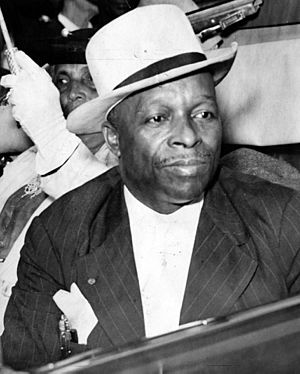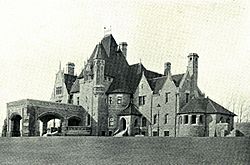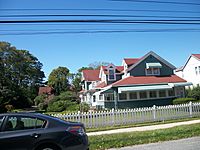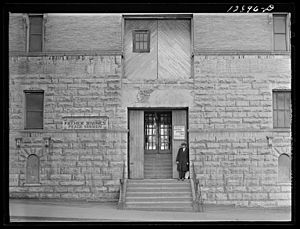Father Divine facts for kids
Quick facts for kids
Father Divine
|
|
|---|---|
 |
|
| Born | c. 1876 |
| Died | September 10, 1965 (aged 89) |
| Occupation | Preacher |
| Spouse(s) | 1st: Penninah Divine 2nd: Edna Rose Ritchings |
Father Divine (born around 1876, died September 10, 1965) was an American spiritual leader. He was also known as Reverend M. J. Divine and "the Messenger." His full self-given name was Reverend Major Jealous Divine.
He started the International Peace Mission movement around 1907. This movement grew from a small group of mostly Black followers into a large church with people of all races from many countries. Father Divine taught that he was God. He worked hard to help his followers become financially independent and to achieve racial equality.
He lived at the same time as other religious leaders like Daddy Grace, Charles Harrison Mason, and Elijah Muhammad.
Contents
Father Divine's Life Story
Early Life and Name
Not much is known about Father Divine's early life or his real birth name. He and his movement did not keep many records. Father Divine often said that "the history of God would not be useful in mortal terms." He also refused to say if he had any family.
Newspapers in the 1930s suggested his birth name was George Baker. However, this name is not officially recognized by the Library of Congress. In 1936, a woman named Eliza Mayfield claimed to be his mother. She said his real name was Frederick Edwards from North Carolina. Father Divine simply replied, "God has no mother."
Most researchers believe Father Divine's parents were formerly enslaved Black people. Records from that time for African Americans were often poor, so his childhood details are still debated. He and his first wife, Peninniah, claimed they were married on June 6, 1882.
Around the early 1900s, he likely worked as a gardener in Baltimore, Maryland. In 1906, he learned about the New Thought movement. This idea focused on positive thinking. It taught that negative thoughts could lead to poverty and unhappiness. This philosophy influenced his later teachings.
Father Divine attended a local Baptist Church. He often preached there. In 1907, he met a preacher named Samuel Morris. Morris would shout, "I am the Eternal Father!" This led to him being kicked out of many churches. Father Divine became Morris's first follower and called himself "The Messenger." He saw himself as a Christ-like figure to Morris's "God the Father."
Later, Father Divine decided that he himself was God. He said he was the only true expression of God's spirit.
Moving South and to New York
Around 1912, Father Divine traveled south to Georgia. He preached there and gained many followers, mostly Black women. He taught that people should not marry and should not focus on gender differences.
In 1914, Father Divine moved to Brooklyn, New York, with a few followers. They formed a shared living space. He told people living with him not to use tobacco or gamble. By 1919, he took the name Reverend Major Jealous Divine. "Reverend Major" showed respect and authority. "Jealous" came from a Bible verse (Exodus 34:14) where God says His name is Jealous. His followers lovingly called him Father Divine.
During this time, Father Divine married Peninniah, one of his followers. She was a few years older than him. Her early life is also not well known, but she was likely from Macon, Georgia. They probably married between 1914 and 1917.
Life in Sayville, New York
In 1919, Father Divine and his followers moved to Sayville, New York. They were the first Black homeowners in the town. He bought his house from someone who wanted to annoy his neighbor. The seller specifically advertised his home to a "colored" buyer.
His movement grew a lot in Sayville. Father Divine held free weekly banquets and helped new people find jobs. He started to attract many white followers, as well as Black followers. His shared house had people of different races living together. This, along with his expensive car, made some neighbors angry.
Sayville Arrests and Trial
On May 8, 1931, Father Divine was arrested for disturbing the peace. He paid his $1,000 bail in cash, which was a lot of money during the Great Depression. His trial was set for the fall. This delay allowed his popularity to grow even more.
That summer, Father Divine held banquets for up to 3,000 people. Cars filled the streets for these gatherings. Neighbors complained that he was disturbing the peace and lowering their property values.
On November 15, police were called to his property because of the noise. A crowd of neighbors gathered. Police told Father Divine and his followers to leave. They waited quietly for ten minutes, then went into police custody.
Seventy-eight people were arrested. Many followers refused to give their usual names, using their "inspired" names instead. Forty-six people pleaded guilty and paid $5 fines. Father Divine paid with a $500 bill, which the court struggled to change. Father Divine, Peninniah, and 30 followers fought the charges.
News about Father Divine's arrest and unusual teachings spread quickly. This event made him very famous. By December, his followers were renting buildings in New York City for him to speak. He often had several events in one night. On December 20, he spoke to about 10,000 people in Harlem.
By May 1932, meetings were held regularly in New York and New Jersey. Father Divine also had supporters in other parts of the world. These followers were mostly middle-class white people. During this time, the movement was officially named the International Peace Mission movement.
Father Divine's trial began on May 24, 1932. His lawyer asked for the trial to be moved because of possible jury bias. The trial took place in Nassau County. The jury found him guilty on June 5 but asked for a lighter sentence. The judge, Justice Lewis J. Smith, ignored their request. He called Father Divine a "menace to society" and gave him the maximum sentence: one year in prison and a $500 fine.
Days later, on June 9, 1932, Justice Smith died of a heart attack. Father Divine was reported to have said, "I hated to do it." He wrote to his followers that he wished his spirit could have changed the judge's mind. The press suggested that the judge's death was a punishment from God, even though the judge had heart problems before.
Father Divine was released from prison on June 25, 1932, after his lawyers appealed. He then stated that important American documents, like the Constitution, were inspired by God. He believed that current leaders had strayed from these ideals. He became more and more patriotic throughout his life.
Moving to Harlem and Pennsylvania
Father Divine moved to Harlem, New York, where he had many Black followers. His followers bought several hotels, which they called "Heavens." Members could live and find jobs there cheaply. He even opened a hotel near Atlantic City, New Jersey, so Black people could go to the beach.
Father Divine and the Peace Mission became the largest property owners in Harlem at one point. The movement also opened many affordable businesses, like restaurants and clothing shops. These businesses sold things cheaply by keeping costs low. They were very successful during the Depression. Father Divine taught that businesses should be economical and only accept cash.
By 1934, the movement had branches in Los Angeles and Seattle, and meetings were held in other countries. While some magazines said he had millions of followers, the actual number was likely tens of thousands.
Father Divine was often asked to support political candidates. He usually did not. However, he formed an unusual partnership with the Communist Party of America in 1934. Even though Father Divine supported capitalism, he liked the party's focus on civil rights.
In 1939, the movement held its first "Divine Righteous Government Convention." They created political plans based on Father Divine's teachings. They opposed school segregation and many of President Franklin D. Roosevelt's social programs, which they saw as "handouts."
Father Divine also focused on stopping lynching. By 1940, his followers gathered 250,000 signatures for an anti-lynching bill he wrote.
In July 1942, Father Divine was ordered to pay money in a lawsuit or face jail. Instead, he moved his main office to Philadelphia, Pennsylvania. He still visited New York, but only on Sundays, because state law prevented him from being served legal papers on that day.
Later Years in Pennsylvania
After moving to Philadelphia, Father Divine's first wife, Penninah, died in 1943. Her death made him realize he was not immortal.
In 1944, songwriter Johnny Mercer heard one of Father Divine's sermons. The sermon was about "accentuating the positive and eliminating the negative." Mercer liked the phrase and wrote the famous song "Ac-Cent-Tchu-Ate the Positive."
In 1946, Father Divine married a white Canadian woman named Edna Rose Ritchings in Washington, D.C. The wedding was kept secret. He claimed that Ritchings, later called "Mother S. A. Divine," was Penninah reborn. This idea of rebirth was not usually part of his teachings. Followers saw her "return" as a miracle.
By the 1950s, the news rarely covered Father Divine. When they did, it was often in a lighthearted way. For example, stories ran when he said Philadelphia was the capital of the world or that he inspired the hydrogen bomb. As the economy improved, fewer lower-class people joined his movement.

In 1953, a follower gave Father Divine Woodmont, a large estate in Pennsylvania. This beautiful manor became his home. He held his banquets there, but less often as he got older.
As his health declined, he continued to ask for civil rights. In 1951, he supported reparations for the descendants of enslaved people. He also wanted neighborhoods to be integrated (people of all races living together). However, he did not join the growing American civil rights movement directly. This was partly because of his poor health and his dislike of using racial labels, as he denied being Black.
Father Divine died of natural causes at Woodmont on September 10, 1965. His widow and remaining followers believe his spirit is still alive. They keep his rooms at Woodmont exactly as they were, as a tribute to his life.
His widow, Edna Rose Ritchings (Mother Divine), became the spiritual leader. In 1972, she stopped Jim Jones from taking over the movement. Jones claimed to be Father Divine reborn. While a few members joined Jones's group, his attempt to take over the Peace Mission failed.
Father Divine's Appearance and Style
Father Divine was a small, Black man, about 5 feet 2 inches tall. He always looked very neat and tidy. He had a well-groomed mustache and neatly combed hair. Since his time in Sayville, he almost always wore a suit in public.
People said Father Divine was very charming. His sermons were emotional and often jumped between different topics. He also used words he made up himself.
He had some unique habits based on his teachings. For example, almost every sermon began with the greeting "Peace!" Father Divine believed that peace should replace hello.
Father Divine's Teachings
Father Divine taught that he was God. He believed his life fulfilled all the Bible's predictions about the second coming of Jesus Christ. He said that Christ existed in "every joint" of his followers' bodies. He taught that he was "God's light" here to show people how to create heaven on Earth and live forever.
His followers would capitalize pronouns when referring to him, like "He" or "Him."
Positive Thinking
Father Divine was part of the New Thought movement. Many of his white followers came from this background.
Helping Others
Father Divine cared deeply about people who were struggling. He was against people accepting welfare. He believed in capitalism. He thought that if people had positive thoughts and connected with God's spirit, they could improve their lives.
Race and Equality
Scholars have different ideas about whether Father Divine was a civil rights activist. But he definitely supported changes for better race relations. For example, he believed that everyone had equal rights. He thought that all members of lynch mobs should be tried as murderers. His campaigns against lynching were very popular in Black communities. He got over 250,000 people to sign his anti-lynching proposals.
Patriotism
Father Divine encouraged his followers to think of themselves simply as Americans. He believed that America was the birthplace of the "Kingdom of God." This kingdom would eventually include the truths of all religions, promoting equality and brotherhood. The movement supported the United States Declaration of Independence, the United States Constitution, and especially the United States Bill of Rights. They believed these documents outlined an ideal way of life.
Living Together
To live this ideal life, Father Divine's followers owned and managed property as a group. The movement worked to help poor people by feeding them and teaching them written English. They believed English was the "universal language."
Chastity and Modesty
Father Divine created an "International Modesty Code." This code forbade tipping, bribes, and receiving gifts. It also said women should not wear short skirts and men should not wear short sleeves.
Even though Father Divine was married, the movement discouraged marriage for followers. In the "Heavens" and other living spaces, men and women lived in separate areas.
Saving Money and Business Rules
Father Divine taught his followers to follow certain economic rules. He was against life insurance, welfare, social security, and using credit. He wanted his followers to be financially independent. It is estimated that his rule against followers accepting welfare saved New York City $2 million during the Depression.
Businesses owned by his followers showed their connection to Father Divine. They followed all his rules. They only accepted cash and never offered or accepted credit. They also sold goods for less than their competitors and refused any tips.
Father Divine's Impact
Civil Rights
Some writers, like Robert Weisbrot, think Father Divine was an early leader in the civil rights movement of the 1950s and 1960s. They believe his experiences growing up in the segregated South influenced him. Others, like Jill Watts, disagree. They argue that his civil rights ideas make more sense when seen as part of his overall teachings.
Religious Legacy
Edna Rose Ritchings (Mother Divine) continued to lead services for the remaining followers until her death. The movement still owns several properties. These include Father Divine's estate Woodmont in Gladwyne, Pennsylvania, his former home in Sayville, New York, and the Circle Mission Church in Philadelphia. The church also has the movement's library.
There are still groups of followers in Pennsylvania and possibly other places. The movement is not controlled by one central group.
In 2004, a magazine called Gastronomica wrote an article about Mother S.A. Divine and the movement's special feasts.
In 2000, the Divine Lorraine Hotel in Philadelphia was sold by the International Peace Mission movement. It was a budget hotel with separate floors for men and women, following Father Divine's rules. The Divine Tracy Hotel in West Philadelphia was sold in 2006.
See also
- List of people who have been considered deities
- God complex
 | Roy Wilkins |
 | John Lewis |
 | Linda Carol Brown |



